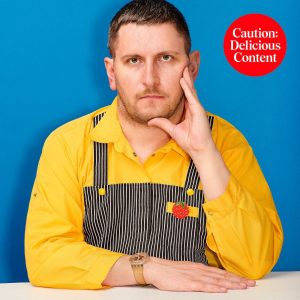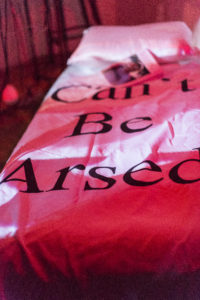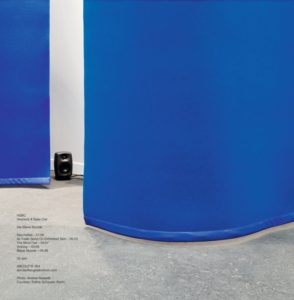Frankly spoken Steve Warwick (aka Heatsick) doesn’t court controversy, he’s just being honest. The casio-wielding performer, who started in drone and ended in house music, might seem to some like he’s chasing the zeitgeist. But with his progressively sparer assemblages of frisky blowouts built for the dance floor -from PAN-released INTERSEX, through to Rush Hour’s Convergence -if you dig a little deeper, you’ll find a clear, though complex, narrative through critical theory, from German sexologist Magnus Hirschfeld’s idea of Zwischenstufe to Parisian architecture
Conversation with the English-born, Berlin-based artist and musician is just as in-depth as his concepts. His vast knowledge-base is equalled only by his willingness to dissect and deconstruct it, from the impact of computers and the internet on a generation, to the vapidity of what can most broadly be referred to as ‘Net Art’. That’s because Warwick’s hypercritical, slightly cynical, nature is mirrored by an evolving oeuvre of looping, self-devouring sound scapes, spiralling nowhere in particular. From his early beginnings as a film student, to Fine Artist, to a Berlin resident creating degenerating cassette tape loops, Warwick’s is a world shaped by experience, observation and erudition, which bizarrely makes from some fairly visceral beats. But then, just because something is of a physical realm doesn’t mean it’s not complex. After all, electronic music in itself is a composite medium bound to the body and Heatsick is its prime example.

Do you think being divisive as an artist is important for creating a discourse?
Steve Warwick: Yeah… but I do find that way of operating also a bit boring. Because if that’s actually the primary way that you operate…
Like M.I.A. or something.
SW: God, yeah.
I find her interesting because it’s like she’s the personification of this era; unedited self-expression through twitter and facebook.
SW: I think they are edited. I would actually say that it’s hyper-constructed and well thought out. But because of the age that we live, it’s actually become unconscious, while at the same time it’s so structured. It’s like a structured reality.
You were born in 1981, so you must still remember a time before the internet…
SW: Yep. I was actually on the precipice of that. I didn’t get an email until I was 19.
Do you feel like you come from a position of privilege? Where a younger generation that doesn’t have an alternative mode of operating from the virtual has no choice but to engage with these sites.
SW: It’s like when we were talking about Twitter. People have absorbed these neo-liberal forms of expression, through lifestyle marketing and advertising. It’s like they’ve become it. It’s not like the whole idea of Kraftwerk saying, ‘I’ve become the machine’ or whatever, it’s not even that. It’s taken to the next level of people absorbing this advertising structure without realising it.
Or people talking in terms of ‘branding’. You’re only calling it that because you’re working within a modern paradigm.
SW: Exactly, it’s the forms we have at our disposal and if you’re dissatisfied with something, you could try and remould something or change it. This is what’s interesting about all this hybridisation that’s going on; that’s the one thing I do like about it. It’s like that whole post-Donna Haraway kind of thing. I just feel like it always gets missed. Where you have people talking about internet art and this dis Magazine scene but that’s when you just take the form of something, without actually any content. So now you have a lot of work, which looks like critical theory but it’s actually just aestheticised; all this ‘Made in China’ bullshit that you see.
Like Item Idem or Shanzai Biennial?
SW: I’m talking about Timur Si-Qin and Aids-3d; all these people in Berlin. I know where they’re coming from but I still think it’s incredibly boring. You’ve got something like Bernadette Corporation. They were a very interesting group I think but we’re living in a time now where what they were doing in the mid-90s has now become incredibly formalised. It’s very relevant to what’s happening now but the sad irony is that we’ve got people who are just taking bits of it, and not in a kind of queer or hybridisation kind of way. It’s just, ‘look at the flat surface of this’.
I sometimes find that form a bit problematic. There’s an incredible foundation for proper discourse but it doesn’t always explore that. It’s like ‘post-post-irony’ with little justification.
SW: Absolutely. It’s just very outdated, it’s retro in a way; playing around with this Andy Warhol idea. It’s so fucking conservative and that’s what makes me really angry. All of this shit is completely conservative and neo liberal and they don’t even realise it. They just think they’re being clever and it’s not clever. It’s completely the opposite. It’s retrogressive, counterproductive and boring [laughs].
It’s interesting, the range of fairly complex ideas, from across media, that influence your music.
SW: Well, I’m trained as a fine artist. I studied film and video initially until the faculty closed and I was working with eight and 16 millimetre loops. I just see it as a natural extension of what I’m doing with this looping pedal that I have, where I can loop up to eight seconds of music.
After they closed our faculty, I started working in a fine art context. So I started playing around with more sculpture, installation and sound. It’s kind of still what I’m doing now. After I graduated, I didn’t have a computer or access to a film faculty for editing, so I literally stopped and was working with printed-matter collage but then also music. What I liked about music, and I still do, is that it’s very immediate.
What was the name of the visual art show you did in the summer?
SW: It’s called Sicherheitsdienst Im Auftrag der BVG. Even if you don’t understand German you get how oppressive it is, just by the title [laughs]. It’s basically the title on the back of the jackets of the private security force, which is employed by the public transport authority. You know, they’re open barriers. Again, you have this idea of transparency and welcoming. It works on ‘trust’, you could say, but then people used to have plain-clothed officers…
So it’s basically an extension of Soviet occupation.
SW: Yes. And also it became visible, where they’re saying, ‘we are the force. We’re employed. We’re a private security force.’ So then the invisible becomes visible but it’s also, at the same time, a distance because it’s a gated community.
This is what I find interesting about social networks and things like Twitter. It’s all about this idea of engagement but actually it’s always privatised, controlled, regulated, in an unregulated market. That’s what I’m against and that’s what I’m referencing and talking about.
You could apply that to ideas of hauntology…
SW: That all comes from [Jacques] Derrida. Spectres of Marx.
These kids doing ‘hauntology’ within music seem to consciously disappear into their own online universes.
SW: It’s a bit like the internet; the word ‘blogosphere’ or something. It’s a structured reality and it does affect us, even though it’s virtual. It’s an invisible force.
It’s like that external compulsion to step in line with online social networking. It’s made very difficult to function outside of it.
SW: It’s like this dark smile: ‘you’re welcome’ but you’re not at all [laughs]. It gets a bit science fiction sometimes. What’s that John Carpenter film… They Live. It gets a bit like that or something.
You mentioned you didn’t have access to a computer after you graduated, do you have one now?
SW: Yeah, I have a computer and I’m involved in all of this. I’m not outside of it and that’s what I’m doing. I’m just commenting on it. I’m just saying that this is how we’re operating.
What drew me to your work in the first place was your PAN release INTERSEX because of those ideas of shifting gender constructs.
SW: It’s like this whole anti-genre thing, of shifting around. It’s basically applying everything you do from these expanded forms of sexuality. You have to acknowledge that it’s there but, it’s like Déviation for me. It’s also a play on ‘deviation’ or whatever, which I found less interesting but it’s also a bit of ‘smirk’; it’s more just this idea of a feedback loop for me. To move on from the field of sexuality, to city planning, the grid of the city, and then the grid of the internet with ‘Convergence’ –smartphones and apps and privatised experience. For me they make logical sense but I think I have to say it as well, because maybe it’s a bit misty.


















